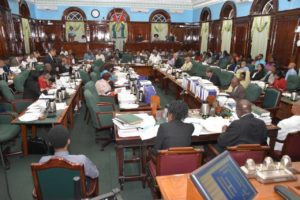 President David Granger has disclosed that nothing has been formalised as yet with regard to establishing Campaign Financing legislation.
President David Granger has disclosed that nothing has been formalised as yet with regard to establishing Campaign Financing legislation.
“Nothing has been formalised. This is something that has to be agreed upon by both sides, and it could be put on the agenda [for discussion during planned talks this month] with the Opposition Leader. But I have not seen a draft…,” the Head of State told reporters on Friday during a press conference – his first for the year and third since getting into office in 2015.
Prior to coming into office, the APNU/AFC Coalition had pushed for the implementation of campaign financing laws, and had even included it as one of its manifesto promises, but even after three years in Government, there has been no active step towards delivering this much-touted piece of legislation.
However, Chairman of the Alliance For Change (AFC), the minority party in the Coalition Government, which has been pushing for these laws prior to 2015 election, Khemraj Ramjattan, back in May had said that they have begun the campaign to draft the legislation. He referenced a previous visit by the Commonwealth Parliamentary Association’s General Secretary Akbar Khan during which they requested assistance in doing so.
Ramjattan had noted he had requested a draft campaign finance legislation from the Commonwealth, and the Secretary General Khan directed him where to get this, along with other source materials.
“So we are going to tap into those resources to come up with a campaign legislation that is modern enough to take care of all the concerns,” the AFC Chairman told reporters.
While in Opposition, the AFC had moved a motion in Parliament to set up political financing legislation in 2011.
In its final report on the 2011 General Election, the Carter Center said the need to create legislation to cater for campaign financing was important, and even reiterated that in its 2015 report.
“To ensure realisation of the right and opportunity to be elected, legal reform is necessary to improve campaign finance laws. Legislation should be strengthened to routinely require disclosure of contributions and expenditures. Consideration also should be given to establishing reasonable limits on donations and expenditures to ensure that the free choice of voters is not undermined, or the democratic process distorted by disproportionate expenditures on behalf of any candidate or party. A monitoring and enforcement body with oversight authority of compliance with campaign finance regulations would also be a positive contribution to Guyanese politics,” the report outlined.
Additionally, the report stated that Guyana’s legal framework for elections was silent in the area of registration and operation of political parties, hence the reason why legislation is needed to establish clear requirements for the registration and operation of political parties that would support the freedom of association and promote broad multi-ethnic parties that could represent citizens’ interests in governance.
According to the Transparency Institute of Guyana, political financing laws are about protecting the State from corporate and other interests, ensuring that incumbents avoid corrupt use of State resources, and ensuring access to resources for all recognised political parties, among other issues.
Monday, December 23, 2024
Recent posts
- APNU/AFC, GECOM expose Guyana to sanctions – PPP
- President Trump urges FDA to consider Chloroquine to treat COVID-19
- US sends strong warning to persons involved in electoral fraud in Guyana
- Coalition cracks – JFAP calls on Granger to “do the right thing”
- Linden man knifes woman and lover to death in jealous rage



